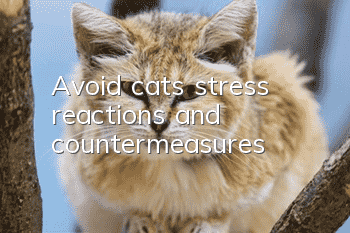Avoid cats’ stress reactions and countermeasures!

Avoid cats’ stress reactions and countermeasures! The so-called stress reaction is when a cat is unexpectedly stimulated by the outside world, enters an excessive self-defense state, and overreacts to people or things outside, such as punching and kicking its owner. , barking in a low and high pitch and howling long, turning into a typical crazy cat among disciplining evil cats. Or other dietary and mental abnormalities.
There are many factors that can stimulate cats. For example, thunder is accompanied by a loud sound of a tire blowing, and the owner unexpectedly touches the cat. Cats are cautious and sensitive animals, so this will It's enough to scare it into a crazy cat.
Cat excessive stress not only poses a threat to life safety, but more frighteningly, it causes great harm to the cat’s own condition. Stress can cause cats to increase blood pressure, blood sugar, and white blood cells. Additionally, primary stress can cause fatty liver disease in cats, causing jaundice and liver cell loss. Some cats also develop lower urinary tract syndrome, self-injurious mental illness, etc. So it is important to avoid stress in cats.
Because cats are territorial and are the boss in their own territory, they will inevitably be timid in a new environment and need time to adapt. Relatively speaking, kittens adapt to a new home more easily than big cats, have less stress response, and get over it faster. Don’t be overly nervous when your kitten comes home just after getting off the plane. Keep an eye on its every move. Because cats are very sensitive animals, they can not only feel the owner's nervousness but also aggravate its nervousness. We southerners will be acclimatized when we go to the north, or northerners come to the south, and cats will be the same. The best way I have concluded is to let the cat stay alone in a quiet room and don't let other cats in the house meet it. Provide it with water and a toilet. Don’t worry about cat food. Cats that have just made a long journey may easily suffer from indigestion if they eat food right away, especially kittens. Even if you give them soft food that is easy to digest, such as canned or soaked cat food. Dry food can be given after 1-2 hours. If your cat has a good appetite, be careful not to overeat. Generally speaking, kittens can adapt to it in 1-3 days. Another thing to note is that cats that have just arrived home cannot be bathed immediately, and it will take at least 10-14 days.
If the cat enters a new environment, it will also be a challenge to its physical condition. The familiar environment and supplies no longer exist, and everything is new to it. At the beginning, the cat’s stress response will also be reflected. As a professional pet doctor, Zhang Xu told reporters that cat plague (detailed introduction), parasites, vomiting, fever, etc. are all cat's stress reactions. Symptoms that were previously latent in the body may break out due to entering a strange environment, so Letting the cat rest is key. Stray cats will also suffer from stress after being adopted. If the cat is very close to people outside, but becomes nervous as soon as it comes home, this is due to the fact that the new environment is a stress trigger for it, and it should be arranged first. The cat’s “first room”, secondly, take the cat to get familiar with some necessary places: cat toilet, water and food storage locations, etc.
- Will the wound of a cat heal very slowly after being sterilized? Some common sense about cat sterilization!
- What changes occur in cats during their first love period?
- Are folded cat ears natural?
- How to take care of Chinchilla cat hair?
- Why do cats get under the covers?
- Is your cat’s hair loss still serious in autumn? Maybe you have ignored these diseases?
- How to wean a cat
- Folded ear cat genetic disease
- Why is the cat drooling?
- Why do cats like their owners to stroke their heads?



